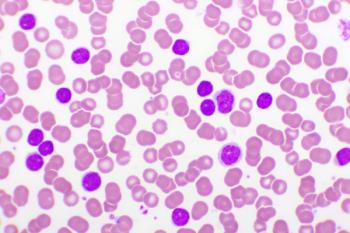
Orforglipron achieved greater A1C reduction and weight loss than oral semaglutide, highlighting its potential as a needle-free option for type 2 diabetes.

Orforglipron achieved greater A1C reduction and weight loss than oral semaglutide, highlighting its potential as a needle-free option for type 2 diabetes.

Employers use carve-outs and cash-pay channels to reduce GLP-1 costs, while Scripta’s Navigator helps members compare prices and find support.

Todd Brown, MD, PhD, explains key considerations for using GLP‑1 drugs in patients with HIV, including titration tips, surgery precautions, and bone/muscle monitoring.

A prospective study of first-degree relatives of patients with MS found that this high-risk population faces significantly elevated incidence rates and has strong willingness to participate in prevention trials.

Mitochondrial DNA heteroplasmy is independently associated with an increased risk of CLL, suggesting potential as a novel biomarker for early risk identification.

Presentations focused on the efficacy of long-acting cabotegravir, doravirine/islatravir, and bictegravir/lenacapavir when used as antiretroviral therapy.

MASLD and type 2 diabetes are closely interconnected conditions driven by shared metabolic dysfunction that together increase the risk of liver disease progression, cardiovascular complications, and mortality.

Abstracts presented during the Conference on Retroviruses and Opportunistic Infections 2026 offered a glimpse into which therapies patients prefer to use to treat HIV.

The ready-to-use formulation supports clinicians and families by addressing historical administration challenges.

Julie Rosenthal, MD, MS, discusses the future direction of research into treating age-related macular degeneration.

At CROI 2026, experts warned that missing HBV screening risks reactivation during HIV therapy switches.

The REPRIEVE study finds statins cut heart events in HIV by lowering lipids, inflammation, and hypertension risk.

Nurse understaffing linked to higher in-hospital mortality, 30-day readmissions, and longer stays.

New data show Chicago’s South Side Level 1 trauma center cuts gunshot travel times and lowers firearm deaths, highlighting equity gains.

Kevin Ma, PhD, discusses new data showing 2024–2025 COVID-19 vaccines reduced hospitalization and severe outcomes.

The authors argue that sustainable drug pricing reform should focus on patient-centered value, not price alone.

Study links moderate to severe alopecia areata to higher atopic dermatitis risk, urging routine screening and smarter treatment choices.

Over 15,000 NYC nurses ratified new contracts after a 41-day strike, securing staffing protections, salary increases, and safety reforms.

As utilization of GLP-1s grows for diabetes and weight management, out-of-pocket expenses and affordability concerns may affect broader health care policy discussions.

A session at CROI 2026 opened with questions on how glucagon-like peptide-1 receptor agonists could be used in HIV.

MA grocery card use was associated with modest increases in wellness, primary care, and specialist visits among dual-eligible beneficiaries, says Jennifer L. Kowalski, MS.

Victor Appay, PhD, explains how long-term ART slows immune aging, boosting HIV viral suppression and paving the way for remission without therapy.

Data from the phase 3 BREAKWATER trial supported full FDA approval of the encorafenib combination for metastatic CRC with a BRAF V600E mutation, demonstrating significant survival gains.

Patients with ocular myasthenia gravis (MG) should be regularly assessed to reduce the chances of progression to generalized MG.

Bruton tyrosine kinase–based therapies show promising but variable efficacy in Richter transformation, current data suggest.

The approval, dupilumab's ninth in the US, is supported by the phase 3 LIBERTY-AFRS-AIMS trial.

Doxy-PEP reshapes STI prevention, while congenital syphilis surges; experts urge scaling HIV and STI care infrastructure to improve testing and treatment access.

New research shows that adherence to antiretroviral therapy and pre-exposure prophylaxis depends on a steady budget through PEPFAR and SNAP.

The increase in CRC-related mortality in younger adults is driven by screening delays and advanced-stage diagnoses, according to Jordan Karlitz, MD.

The authors discuss ways to ensure that accountable care organizations do not bear the cost of inaccurate spending growth predictions.